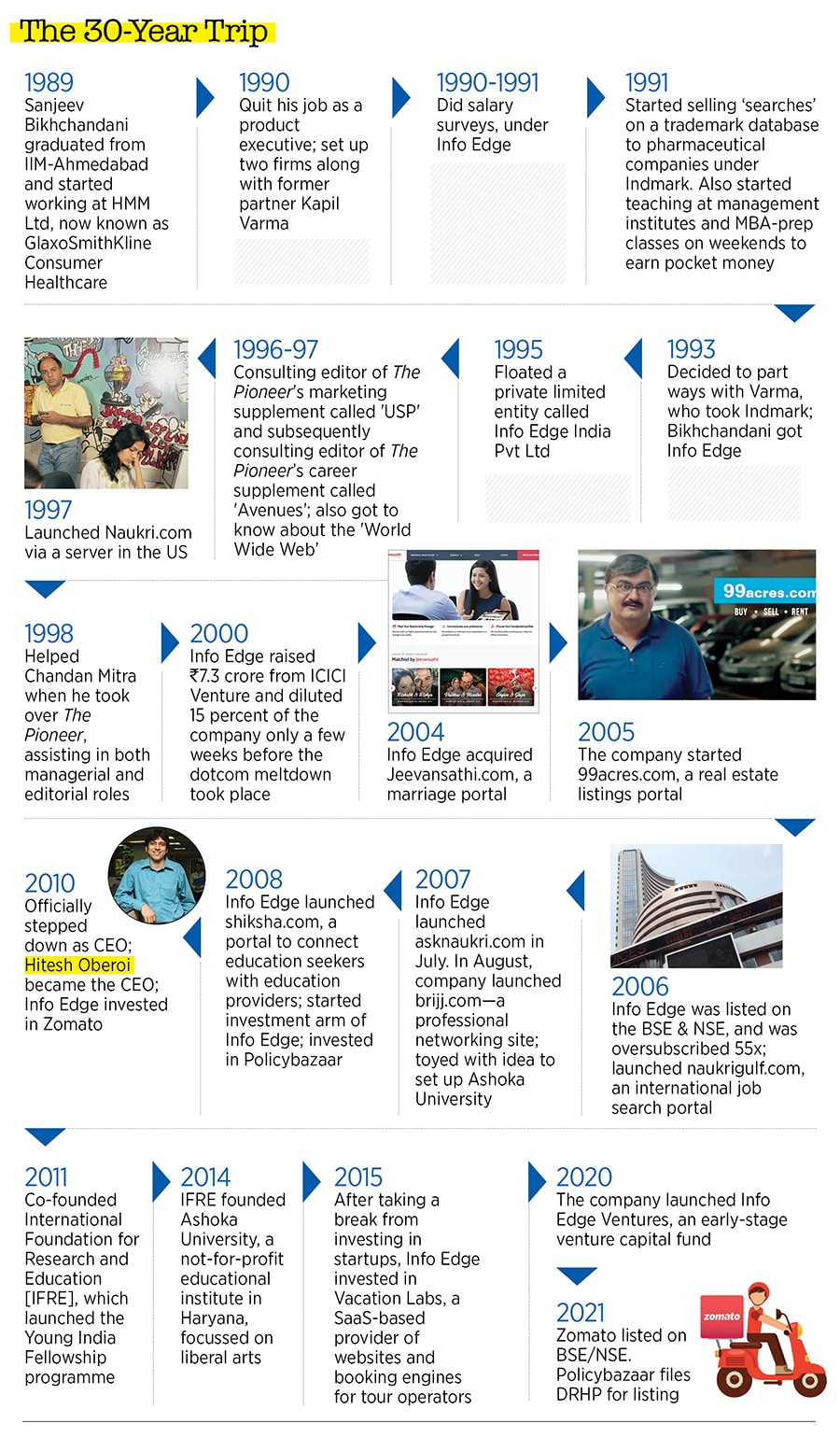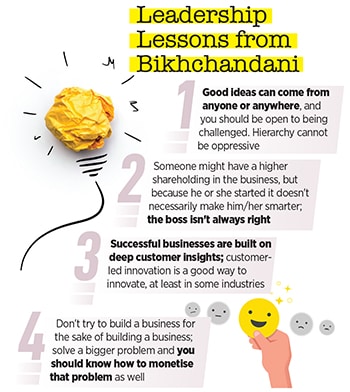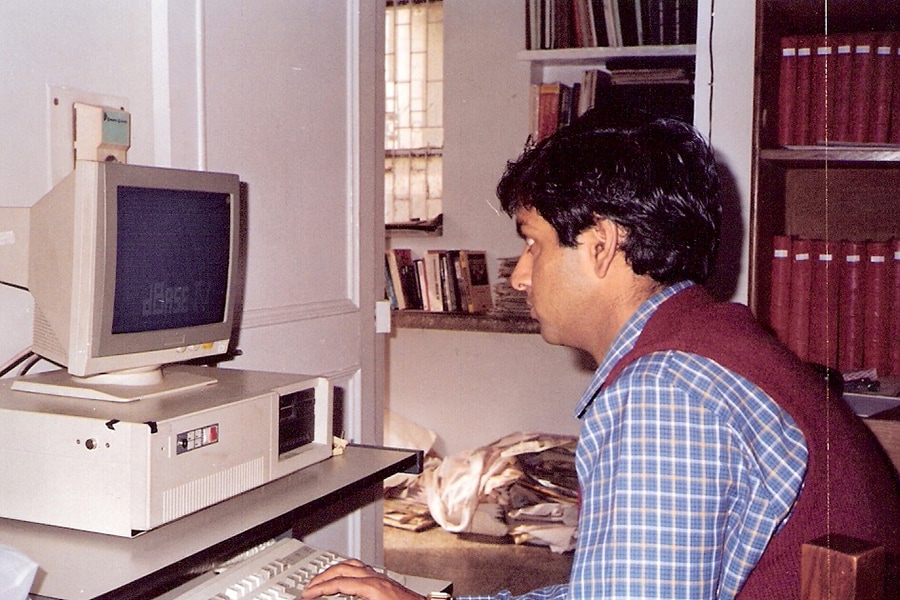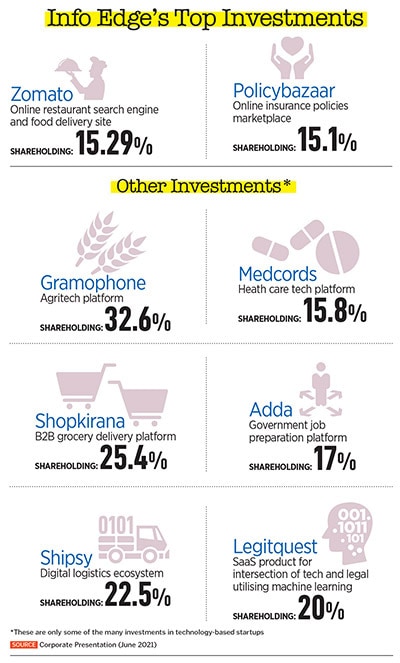In 1991, when the winds of economic liberalisation swept the country, he, along with a partner, started a business selling ‘searches’ on a trademark database to pharmaceutical companies. “We didn’t take any salary since we were making only enough money to cover our costs," he says. On weekends, he would teach at management schools and earn a meagre ₹2,000-2,500 per month of this, he would pay ₹800 to his father as rent.
“I was extremely keen to be an entrepreneur. I had no big idea and no vision," recalls Bikhchandani, who would think of three new business ideas a day. Along with his partner Kapil Varma, he set up two firms—Indmark (trademark database) and Info Edge (salary surveys and consulting). In 1993, he parted ways with Varma and formally incorporated Info Edge India Pvt Ltd in 1995.
Around the same time, Yashish Dahiya a third-year IIT-Delhi student first saw Bikhchandani at one of his CAT test prep classes at Lady Hardinge Medical College, Delhi. “He was this young, tall, smart-looking personality. When I asked someone who he was, they told me he was Sanjeev Bikhchandani and that he was running this training programme, which was conducted professionally," recalls Dahiya, who kept interacting with him over the years. Little did he know then that Bikhchandani would not only be an investor but also a mentor for his startup, Policybazaar, some years later.![]() India’s Internet Boom
India’s Internet Boom
“Successful businesses are built on deep customer insights," says entrepreneur-turned-investor Bikhchandani, now 58.
Back in 1990, when he was working as a product executive for Horlicks at HMM, now GlaxoSmithKline Consumer Healthcare, Bikhchandani had picked up some insights. He noticed that all his colleagues—most of them IIM or other good business school graduates—would be reading the back pages of Business India. This was because the last few pages of the magazine were filled with job advertisements.
“Very few were reading articles… most of them were only reading the job ads and discussing them," he says. “There were talented guys, who had the best job they could have had at the time. The company (HMM) had good brands and it paid well there was no reason to be unhappy. I found this behaviour strange."
That’s when he realised ‘jobs’ is a high-interest category. Also, he noticed that every time his colleagues got interview calls, they were for a different job and a new company. That was his second insight: “There were a lot of jobs which were not being advertised… what appears in print is only the tip of the iceberg."
Bikhchandani thought to himself that if someone builds a database of jobs, and keeps it live and current, it could be a powerful product. It was one of the many ideas that he toyed with only to shelve it later.
Cut to October 1996. Bikhchandani was visiting an IT Expo at Pragati Maidan, Delhi, when he came across a stall with a sign that read ‘WWW’. He was told it stood for the ‘world wide web’ or the internet. The stall manager gave him a demo on a black-and-white screen. “He went to a site called ‘Yahoo’ and asked me if I wanted to ‘browse or search’. Like a good Indian, I asked him to search for ‘India’. A whole bunch of results popped up," recalls Bikhchandani, who made up his mind in 10 minutes to launch a job aggregation website.
Getting internet back then was an expensive affair and setting up a website even tougher since all the servers were in the US. There were only 14,000 internet accounts in India in those days. “It might seem like a small number now, but it looked like a large number back then," he says. Bikhchandani rented a server in the US for $25 per month and launched naukri.com in 1997. “I had done 20 small things by then… this was the 21st small thing," he says.
![]() Naukri.com: Finding Its Ground
Naukri.com: Finding Its Ground
In 1997, every week, the team at naukri.com collected 29 newspapers and magazines from across the country, rehashed all the job listings published there and posted them on the website. “Traffic started building and slowly, we started getting enquiries from companies, asking us to put up job listings. We told them to pay us for the same," says Bikhchandani. The more the job listings, the better was the traffic, and hence more response and more clients. That was the revenue model.
In 1996-97, Info Edge"s turnover was roughly ₹12 lakh. The goal was to grow 5x in three years and reach ₹60 lakh. “We had to get 500 companies every month and convince them to pay ₹1,000 to list one job on the website per month, which meant a revenue of ₹5 lakh every month," says Bikhchandani.
Just when things were looking up, the dotcom crash happened and several internet s went belly up. Luckily, about two weeks before the crash, Info Edge (that owns naukri.com)had raised ₹7.3 crore from ICICI Venture and diluted 15 percent of the company. It was around the same time that naukri.com started facing competition from players like jobsahead.com.
However, Bikhchandani believes Naukri’s pricing strategy set it apart. “Our price per listing was ₹350 and an annual subscription [was] ₹6,000, where the company could list all jobs for one year," he says. “Our competition priced a single job listing for ₹3,500… they were comparing it to display ads in newspapers."
![]() “None of my friends were in entrepreneurship... I was barely in touch with most anyway because there was no internet or mobiles. So it was lonely, but you soldiered on and hoped for the best," says Bikhchandani.
“None of my friends were in entrepreneurship... I was barely in touch with most anyway because there was no internet or mobiles. So it was lonely, but you soldiered on and hoped for the best," says Bikhchandani.
Tough Days
Unlike today, getting external funding was not a cakewalk then. It took Bikhchandani 10 years to get venture capital (VC).
“It was a six-month struggle to get a ₹30,000 overdraft limit from a nationalised bank in 1992. That’s because banks would not lend money if you could not give collateral, which basically meant services companies could not get bank finance," recalls Bikhchandani. “I didn’t have any money, my father was a retired government doctor and my mother was a homemaker. We had to depend on customer advances and not take our salary." From 1990 to 1993 and then 1997 to 2000, Bikhchandani did not take a salary. The only way to stay afloat was to keep costs low and work hard.
There weren’t any role models either. “None of my friends were in entrepreneurship... I was barely in touch with most anyway because there was no internet or mobiles. So it was lonely, but you soldiered on and hoped for the best," says Bikhchandani.
Building a strong team took effort, too. For the more expensive resources—IIT and IIM graduates—he would do a revenue share or equity deal, since he couldn’t afford to give a fixed salary. The junior staff was paid a fixed salary of a few thousand rupees, with a high variable pay—depending on the revenue—and a low fixed pay.
With the writing on the wall, nobody wanted to join a dotcom. Info Edge benefited from this. “While other dotcoms were shutting down, we were breaking even because of our revenue model. We also had some VC, so we managed to hire talent that was released by other dotcoms," explains Bikhchandani.
Post the dotcom crash, Info Edge didn’t spend on advertising but rather on hiring sales people and improving the product. After making small losses for two years, the company broke even again, at a much higher revenue base. “Since then, we have continued growing and been profitable throughout," says Bikhchandani. The office, too, moved to a bigger space—on the second floor of Bikhchandani’s father’s house. And in February 2000, Hitesh Oberoi, an IIM-B graduate then working at Hindustan Lever (HUL) joined the company.
Oberoi, then 27, reached out to Bikhchandani around August 1999 for advice, as he was planning to quit his job and join an internet startup in Bengaluru. “He said, ‘Listen, if you’re thinking of doing something on your own, why don’t we do something together?’" recalls Oberoi. So, they decided that Oberoi would start a discounts and deals platform called ‘Bachao
Turning Point
When Oberoi came on board, naukri.com used to reach potential customers through direct mail—sending out brochures with forms for jobs, and asking for cheques in advance. “HR managers were clueless about how to use the internet to hire, and needed to be educated about the product," says Oberoi. “[As a solution] I suggested hiring sales people and having them go out in the market to speak to customers and recruiters directly."
![]()
The average salesperson was making sales of ₹50,000 a month. “The total cost of a salesperson, including salary, conveyance, rent etc., came up to ₹22,000 a month. This meant he was making [the company] a profit of ₹28,000 a month," Bikhchandani says. Within two years, they recruited 240 salespersons across 11 cities.
In 2001, the team created a Yahoo group with sales people. “We told them, whatever feedback you get from any sales call, put it on this group," says Bikhchandani. This channel became a funnel of ideas from clients and users on how to improve the product. “The more you talk to customers and listen to them, the more they will push you to innovate. You implement what he or she wants, and they will keep buying your product," he adds.
Based on the feedback, new products and features were introduced. “The resume database product, Resdex—introduced in 2003—was extremely successful and helped us grow rapidly. Even today, it accounts for 65 percent of revenue," says Oberoi. “Because we managed to put in place this sales system and launch higher priced new products , we did not have to raise money ever again, and we became profitable quickly. We raised one round—₹7.3 crore from ICICI Venture—and that was it."
Bikhchandani and Oberoi had a vision to build a small, profitable business. “We did not set out to build a unicorn," says Oberoi with a laugh.
Passing On The Baton
After being profitable for a few years, in 2006 Info Edge became one of the first internet ventures to be listed on the BSE and NSE. “The IPO was a dream, but a distant dream," says Bikhchandani. “One day, around 2004-end, a banker friend of mine from Hong Kong visited us. He said the number one job site in China has gone public it could be time for you to go public too, as the number one job site in India."
Bikhchandani and his team visited Hong Kong, spoke to analysts and lawyers, and were convinced that it was possible to go public. “I got ready to delegate a lot more, Hitesh was called COO, but he would be the de facto CEO. The CFO and I spent a lot of time working on the IPO… it took us 11 months to get everything in shape," he says. In October 2006, Info Edge went public and was oversubscribed 55x.
After the listing, Oberoi was increasingly running the company, though Bikhchandani was CEO. “We had money sloshing around in the bank, the company was highly profitable and it couldn’t absorb the money we had raised. We thought of acquiring a company, but soon realised it was too expensive. So, we decided to invest instead," says Bikhchandani.
In 2008, Info Edge invested in Policybazaar, an insurance aggregator company. It was one of the first startups it invested in. “Sanjeev is a risk-averse person. Even in good times, he keeps pointing out things that can go wrong," says Dahiya, CEO and co-founder of Policybazaar.
In 2010, Oberoi became CEO while Bikhchandani took care of board matters, corporate governance issues, media, government interactions, industry forums, investor relations and investments.
![]()
Taking On A New Role
As an investor, Bikhchandani doesn’t believe in chasing IRR (internal rate of returns) or asking questions like, ‘How much will we make in 7-8 years?’ He believes in backing good people, both via Info Edge and in his personal capacity. Some of his investments via Info Edge, apart from Zomato that went public in August and Policybazaar, include DotPe, Bijnis, MedCords, Gramophone and Shipsy, and are among the 19 startups they have invested in.
![]() Info Edge invested in DotPe, a commerce and payments platform, after its launch in February 2020. Shailaz Nag, co-founder and CEO of Dotpe, says, “I realised what a down-to-earth person he was when he called me soon after the pandemic to check on me." Bikhchandani would regularly follow up with Nag on how the business was doing. “There was a product we had launched which wasn’t working well. I told Sanjeev that we need to shut it down," recalls Nag. “He spent the next two hours trying to understand the product and then made two suggestions. We implemented those, and today, it is working beautifully for us."
Info Edge invested in DotPe, a commerce and payments platform, after its launch in February 2020. Shailaz Nag, co-founder and CEO of Dotpe, says, “I realised what a down-to-earth person he was when he called me soon after the pandemic to check on me." Bikhchandani would regularly follow up with Nag on how the business was doing. “There was a product we had launched which wasn’t working well. I told Sanjeev that we need to shut it down," recalls Nag. “He spent the next two hours trying to understand the product and then made two suggestions. We implemented those, and today, it is working beautifully for us."
Slurrp Farm, a health food company, was raising investments from friends and family in early 2018, when it found out that Bikhchandani wanted to invest. “We had to make space because we wanted to have him as an investor, and more as a mentor," says Meghana Narayan, co-founder, Slurrp Farm. Bikhchandani has tasted its products and given his feedback on packaging. Narayan says, “One tactical thing he told us to do was: Put your WhatsApp number on the front of the pack."
According to Dahiya, Bikhchandani doesn’t get excited by the good times. “In the initial days, many times we would miss our numbers by 15 percent and feel bad about it. While we would expect a scolding, he would be encouraging us. He is most supportive during the downturns," he says.
Bikhchandani is one of the few investors who sits for three hours in a board meeting, and then asks, “What do you need from me?" One of the best pieces of advice Bikhchandani gave Nag was: “Don’t try to build a business for the sake of building a business solve a bigger problem and you should know how to monetise that problem as well.
![]()
IPOs: 2006 vs 2021
In June 2010, Bikhchandani, an avid user of Foodiebay that aggregated restaurant menus, wrote an email to the admin contact of the organisation:
Deepinder,
I have been using Foodiebay for a while and I find the site extremely useful.
Well done.
I would like to connect anytime convenient.
Sanjeev
The admin contact, Deepinder Goyal, was, in fact, the founder of Foodiebay, now known as Zomato. Bikhchandani says, “Deepinder did not know who I was. When he saw my email id, he thought I’m a naukri.com salesperson, and so, he didn’t get back to me for two days." Once he realised Bikhchandani was the CEO, Goyal went to meet him.
Goyal set up Foodiebay when he realised most people in his office at Bain & Company lived away from home, ate two meals a day in office and needed access to menu cards. A penny dropped in his head, just like it had for Bikhchandani in 1996. Goyal realised there was value in aggregating menu cards.
Though Bikhchandani had no checklist, he focussed on two things before investing in a company: Is the website getting natural traction and where the idea came from. “Another question we ask the founder is: ‘After we fund you, what is the salary you want to pay yourself?’ We aren’t interested in the answer, but how he or she thinks about it. It says a lot about the person," says Bikhchandani. Zomato ticked all the boxes, and they invested ₹4.7 crore in 2010.
Eleven years later, Zomato has listed on the BSE and NSE. The ₹9,375-crore IPO has seen a stellar response with 38.25 times subscription. Though things are a lot different now compared to when Info Edge went public, Bikhchandani says, “Each era has its own challenges Zomato had different challenges. You are taking a company public that is not yet making a profit in a market like India."
He adds that Zomato had an offer to list in the US, which would have been more lucrative, but Goyal chose to list in India. “We got feedback from online brokerages that they had a record number of new account openings. People who have never invested in the stock market, but were millennials and perhaps Zomato customers opened demat accounts, saying this is ‘my company’ and invested for the first time," says Bikhchandani. The Zomato listing has shown the way forward for Indian startups. Bikhchandani believes: “If your market is in India, your operations lie in India, why on earth should we list overseas?"
Staying Grounded
The Indian internet pioneer made his debut on Forbes’s World’s Billionaires list in 2019 with a net worth of $1 billion. According to Forbes, his current net worth (as on August 7) is $3.1 billion. When asked what wealth means to him, Bikhchandani says, “It is embarrassing when people discuss this topic with me. There is always a doubt: Do I deserve it?"
Though he doesn’t talk about it too much, Bikhchandani has been actively giving back to society. In 2014, he co-founded Ashoka University, a not-for-profit educational institute in Haryana, focussed on liberal arts. He is also one of the board members of Chintan, an NGO working on urban waste management, and a founding donor for The 1947 Partition Archive, an organisation that captures stories of Partition survivors. These are only a few of the 20 organisations he works with. He has also been working in the space of Covid-19 relief work.
Bikhchandani started off as an entrepreneur, turned into an investor and mentor, and is now a philanthropist as well. Can someone get this wealthy without being lucky? “You gotta be lucky. A friend of mine once said: There are many definitions of luck. But one definition is that luck is about being in the right place at the right time. But if you are in enough places, enough times, for long enough, sooner or later, you will be in the right place, at the right time. So be persistent and try hard, don’t give up," he says."

 India’s Internet Boom
India’s Internet Boom Naukri.com: Finding Its Ground
Naukri.com: Finding Its Ground


 Info Edge invested in DotPe, a commerce and payments platform, after its launch in February 2020. Shailaz Nag, co-founder and CEO of Dotpe, says, “I realised what a down-to-earth person he was when he called me soon after the pandemic to check on me." Bikhchandani would regularly follow up with Nag on how the business was doing. “There was a product we had launched which wasn’t working well. I told Sanjeev that we need to shut it down," recalls Nag. “He spent the next two hours trying to understand the product and then made two suggestions. We implemented those, and today, it is working beautifully for us."
Info Edge invested in DotPe, a commerce and payments platform, after its launch in February 2020. Shailaz Nag, co-founder and CEO of Dotpe, says, “I realised what a down-to-earth person he was when he called me soon after the pandemic to check on me." Bikhchandani would regularly follow up with Nag on how the business was doing. “There was a product we had launched which wasn’t working well. I told Sanjeev that we need to shut it down," recalls Nag. “He spent the next two hours trying to understand the product and then made two suggestions. We implemented those, and today, it is working beautifully for us."